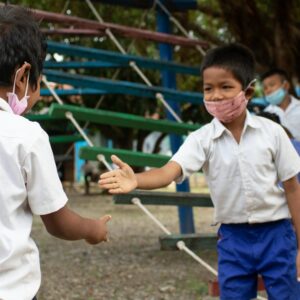In the face of the COVID-19 pandemic, teachers have shown incredible self-sacrifice to prevent millions of children from dropping out of school. Paying tribute to them on this World Teachers’ Day (5 October 2020) is therefore essential and well deserved. But urgent and essential measures are expected to finally give them the means to become the pillars of an inclusive and quality education system.
The Covid-19 pandemic is one of those crises which takes everyone by surprise and for which there is no manual or user guide. At the height of the pandemic, when 1.6 billion children were left without education overnight, more than 63 million teachers (primary and secondary) around the world had to deal with the immediate consequences of the pandemic with professionalism and courage. It is hard today to consider a tribute that is commensurate to the commitment of these men and women, who have overcome countless challenges to enable millions of children and young people to learn. And yet teachers everywhere deserve such recognition more than ever.
An unparalleled tribute
Far from being trained to intervene in a crisis situation, teachers have nevertheless adapted to this emergency, thinking and innovating to maintain remote learning, working hard to adapt their teaching to the context, to new practices and to children at very mixed levels. They’ve also had to ensure the dissemination of their teachings to as many people as possible, master digital resources or sometimes innovate to reach private audiences with internet connections or IT tools.
And many did so under poor conditions: without training, without adequate equipment, without resources, without internet connection, without support or advice from their superiors and left in the dark. But despite the more than difficult conditions, the teachers rolled up their sleeves and carried out their mission to the end. The majority of female teachers showed even greater courage: in addition to their work, they had to take on all the household chores and care for their children while teaching from home.
Teachers often neglected
The Aide et Action teams who have supported the teachers throughout this period have seen their courage and determination. They have counted neither their hours nor their efforts to ensure that as many children as possible have access to quality education.
In northern Cambodia, our teams supported them in the midst of the pandemic so that they could record their lessons so they could be broadcast on the internet, on television or on the radio. And so that the poorest and most vulnerable children, those deprived of any connection or digital tools, also have access to pedagogical continuity; teachers have also had recourse to cell phones and applications such as Whatsapp or Messenger.
In other parts of Cambodia, on the advice of our teams, they resorted to video. The teachers thus asked the poorest families to film their children while they were reading or revising their lessons and to send them to them in order to judge for themselves the learning and work of the children and to provide them on a case-by-case basis tailor-made advice. Over the past few months – and for many this is not yet over – teachers have therefore made flexibility and adaptation the keywords of their teaching since March 2020 and for that, they undoubtedly deserve our admiration.
On the frontlines
So, of course, there was much praise and thanks for the teaching teams and now, many parents better understand the reality of this “not that easy” job. But words are not enough, actions are lacking. Before the pandemic, the working conditions of teachers were already difficult (lack of materials, overcrowded classes, lack of respect, increased rudeness, lack of adequate training , etc.), the health crisis only made matters worse. And today the risk is so great that many teachers will throw in the towel, tired from months of mobilisation and discouraged by the lack of consideration and listening to which they are entitled.
In many low-income countries, following the COVID-19 pandemic, governments are likely to prioritise investments in health or the economy and further reduce budgets allocated to education: some have already started to pay teachers’ salaries more; in others they will probably reduce them in the coming weeks. It is likely that they will not hesitate to cut back on teacher training, to recruit even more temporary workers without training or qualifications to ensure a semblance of academic continuity to the detriment of the quality of education.
Without adequate resources, the reopening of schools will not happen in optimal conditions: teachers will welcome children that have been traumatised for months of lockdown, needing psychological and educational support to avoid permanent dropout. But without the right resources, teachers will not be able to provide the appropriate educational response to prevent an entire generation of children from severely impacted by COVID-19.
Building teacher ‘leadership’
Here, at Aide et Action, we believe that the teacher is the key element in rebuilding a resilient and sustainable education system and that their driving role in the classroom and in school must be strengthened.
The teacher is the one who shows the way to knowledge. They are both a transmitter of knowledge, a role model and a builder of mind, on the front line with the adults of tomorrow. Only they know and are aware of what works and what does not, and what is possible. Consequently, it is essential that this experience and know-how be used to create the most suitable pedagogies and programs. Freedom and support must be given to teachers to accompany – to bring back on the path of education – all pupils and so that no one is ever left behind.
This leading role of teachers should not only apply to “teaching and curricula, but also to governance, effectiveness, effective coordination, monitoring and evaluation of learning and development. student success ” as already stated in the Incheon Declaration in 2015. However, time flies and as the UNESCO emphasises this year on World Teachers’ Day, the issue of teacher leadership has largely been neglected. The COVID-19 crisis shows us to what extent it is no longer possible to wait today to finally give teachers the place and the recognition they deserve: the achievement of quality education which is inclusive for all depends on it.









